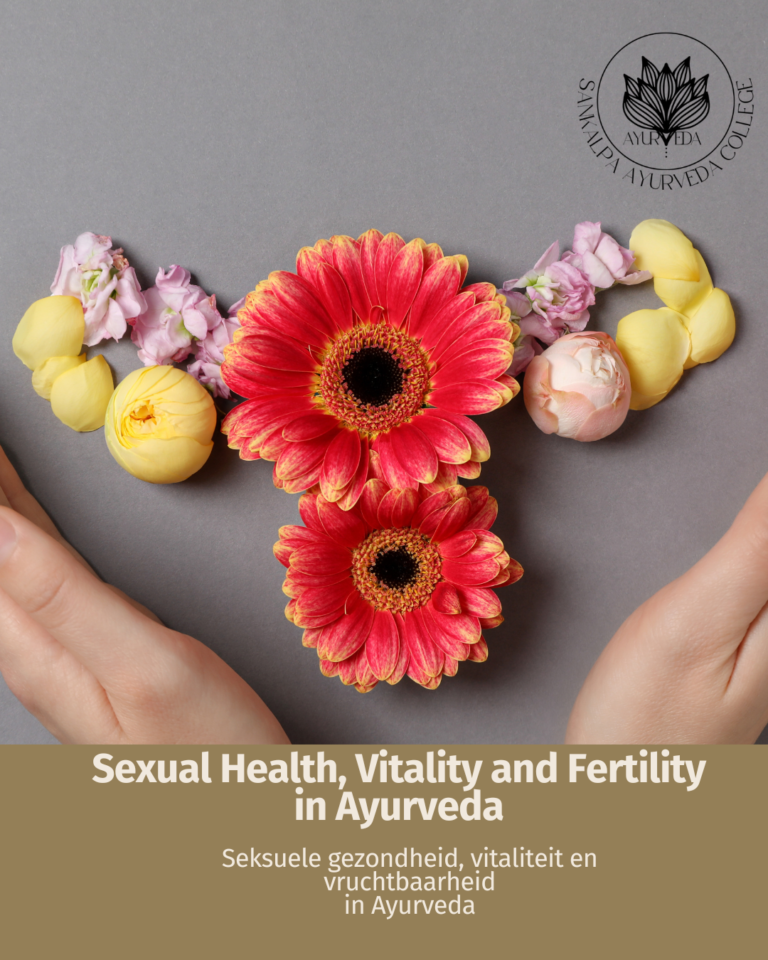
Maintaining vitality and sexual health is essential not only for procreation but also for overall well-being and happiness. Ayurveda, the ancient science of life, offers profound insights into enhancing vitality, improving sexual health, and boosting fertility. This article explores the Ayurvedic perspective on these aspects, common imbalances, early signs of reproductive health issues, and effective preventive practices, including the management of endocrine disorders.
Understanding Vitality and Sexual Health in Ayurveda
Ayurveda views vitality and sexual health as integral components of overall health, governed by the balance of the three doshas: Vata, Pitta, and Kapha. These energies influence reproductive functions, libido, and overall vitality. A balanced state of these doshas ensures optimal sexual health and fertility, while imbalances can lead to various reproductive issues. In Ayurveda, health or “Swasthya” is defined as a state where the doshas, digestive fire (Agni), body tissues (Dhatus), excretory functions (Malas), and the mind and senses are in a state of balance and harmony.
Early Signs of Imbalances
Early signs of reproductive and endocrine imbalances can include irregular menstrual cycles, low libido, fatigue, mood swings, unexplained weight changes, and digestive disturbances. Recognizing these signs early can help in taking preventive measures to restore balance.
Root Causes of Reproductive and Endocrine Imbalances in Ayurveda
Ayurveda identifies several root causes for reproductive and endocrine imbalances:
- Dietary Factors : Consuming foods that aggravate specific doshas can lead to imbalances. For instance, excessive intake of spicy, hot foods can increase Pitta, affecting reproductive and endocrine health.
- Lifestyle Choices : Irregular routines, lack of sleep, and excessive stress can disturb the natural balance of doshas, leading to issues like low libido, infertility, and endocrine disorders such as thyroid imbalances.
- Emotional Stress : Unresolved emotions and mental stress can exacerbate dosha imbalances, particularly Vata and Pitta, affecting sexual vitality, fertility, and endocrine function.
- Toxins (Ama) : Accumulation of toxins due to poor digestion and lifestyle choices can obstruct reproductive and endocrine channels, leading to disorders.
Modern and Functional Medicine Perspectives
Modern medicine often attributes reproductive and endocrine health issues to hormonal imbalances, lifestyle factors, and environmental influences. Conditions like infertility, low libido, and thyroid disorders are linked to stress, poor diet, and exposure to toxins. Functional medicine emphasizes the role of diet, gut health, and environmental toxins in reproductive and endocrine health, advocating for a holistic approach through personalized nutrition and lifestyle interventions.
The Role of Detoxification
Detoxification is a cornerstone of Ayurvedic practice, aimed at eliminating toxins (Ama) from the body. Toxins can accumulate due to poor digestion, environmental pollutants, and stress, leading to impaired reproductive and endocrine function. Ayurvedic detoxification methods, such as Panchakarma, help cleanse the body and mind, restoring balance and vitality.
Rasayana: Rejuvenation for Vitality and Fertility
Rasayana, the practice of rejuvenation, is a powerful Ayurvedic approach to enhance vitality and fertility. It involves the use of specific herbs and therapies to nourish the body, improve energy levels, and support reproductive and endocrine health. Regular Rasayana practices can boost libido, enhance fertility, and promote overall well-being.
Preventing Reproductive and Endocrine Health Issues
Ayurveda emphasizes prevention through lifestyle and dietary practices. Here are some powerful preventive measures:
- Diet and Nutrition : Consuming a balanced diet rich in antioxidants, healthy fats, and fertility-boosting herbs like Ashwagandha and Shatavari can enhance reproductive and endocrine health and vitality.
- Daily Routine (Dinacharya) : Establishing a consistent daily routine helps balance the doshas. This includes waking up early, practicing mindfulness, and engaging in regular physical activity.
- Yoga and Pranayama : Yoga poses like Baddha Konasana (Bound Angle Pose) and Pranayama techniques such as Kapalabhati (Skull Shining Breath) improve circulation, reduce stress, and enhance reproductive and endocrine health.
- Meditation : Regular meditation calms the mind, reduces stress, and promotes emotional stability, which is crucial for maintaining sexual health, fertility, and endocrine balance.
Insights into Reproductive and Endocrine Health Disorders
- Infertility : Often linked to Vata and Pitta imbalances, infertility can be managed by incorporating grounding practices, warm oil massages, and herbs like Shatavari and Gokshura.
- Low Libido : A common Vata disorder, low libido can be alleviated through grounding foods, regular routines, and calming practices like meditation and gentle yoga.
- Thyroid Disorders : Imbalances in thyroid function are often associated with Kapha and Vata imbalances. Ayurveda recommends a diet that supports thyroid health, regular exercise, and herbs like Kanchanar and Guggulu.
- Menstrual Disorders : Conditions like irregular periods and PMS are associated with dosha imbalances. Ayurveda recommends a diet rich in iron, regular exercise, and herbs like Ashoka to support menstrual health.
Recurrence and Prevalence Over Time
The recurrence and prevalence of reproductive and endocrine health issues have significantly increased over the past decades. This rise can be attributed to several factors:
- Lifestyle Changes : Modern lifestyle factors, such as increased stress, poor diet, and lack of physical activity, may contribute to the higher incidence of these issues.
- Environmental Factors : Increased exposure to environmental toxins and pollutants over the decades may also play a role in the rising prevalence of reproductive and endocrine health disorders.
- Aging Population : As life expectancy has increased, more individuals are experiencing age-related reproductive and endocrine health challenges.
Conclusion
Ayurveda offers a holistic approach to enhancing vitality, sexual health, and fertility, while also addressing endocrine disorders. By understanding the doshas and incorporating preventive practices like a balanced diet, regular exercise, and mindfulness, we can nurture our reproductive and endocrine health and enhance our quality of life. Remember, these insights are for informational support and should not replace professional medical advice. Always consult with a healthcare provider for personalized guidance.
By embracing these Ayurvedic principles, we can cultivate a balanced body and mind, prevent reproductive and endocrine health issues, and lead a fulfilling life.
Some interesting articles from colleagues:
https://drmteitelbaum.com/treating-endometriosis-with-ayurvedas-deep-wisdom/
https://www.ayurvedacollege.com/blog/shukra-dhatu-reproductive-tissue/
https://www.vitalveda.com.au/learn/circadian-medicine/contraception/
https://www.vitalveda.com.au/learn/ayurvedic-pregnancy-guide/
https://www.vitalveda.com.au/learn/ojas/
https://www.vitalveda.com.au/learn/male-infertility/
https://lifespa.com/intro-ayurveda/what-is-ayurveda/ojas/
https://www.vitalveda.com.au/learn/cognitive-mental-health/dr-john-douillard/
Disclaimer
The information provided on this blog is for informational and educational purposes only. While we strive to provide accurate and up-to-date information, the content of this blog is not a substitute for professional medical advice, diagnosis, or treatment. Always seek the advice of a qualified healthcare provider or Ayurvedic practitioner with any questions you may have regarding a medical condition or before making changes to your health regimen.
The opinions and views expressed in this blog are those of the author and do not necessarily reflect the official policy or position of any agency or organization. We do not accept any responsibility for any errors or omissions in the content of this blog or for any actions taken based on the information provided.
Use of the information on this blog is at your own risk. We recommend seeking professional advice before making decisions that could affect your health and well-being.




